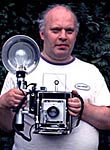|
|
 
|
|
Author
|
Topic: Hub Help
|
|
|
|
|
|
|
|
|
|
|
|
|
|
|
|
|
|
|
|
|
John Hawkinson
Film God

Posts: 2273
From: Cambridge, MA, USA
Registered: Feb 2002
|
 posted 04-07-2003 09:45 AM
posted 04-07-2003 09:45 AM




It's worth noting that there is a lot of industry confusion about terms like "hub," "switch," "bridge," "repeater," and even "router." The terms have evolved and changed over time, and not to the benefit of clarity or consistency.
The definitions given earlier in this thread are the generally accepted ones (hubs do not isolate the collision domain and share the bandwidth across ports, switches can let each port reach the full bandwidth when talking to any other port), but that is not universal, so check closely the specifications on what you purchase if it matters.
Also, switches have finite backplane bandwidth, so a cheap 10-port 10mbps switch is unlikely to support 5 10mbps conversations between pairs of ports.
--jhawk
| IP: Logged
|
|
|
|
|
|
Stephen Furley
Film God

Posts: 3059
From: Coulsdon, Croydon, England
Registered: May 2002
|
 posted 04-08-2003 07:10 AM
posted 04-08-2003 07:10 AM




I would recommend the Netgear FS105 5 port switch, there's also the 8 port FS108 if you need it. They are low cost, small, well built with metal cases, and seem to be reliable. We have loads of them. They do 10 or 100 Mb/s, have auto uplink (no need for crossover cables), the only problem we've had was with a few of the very early ones where the power supply plug was a poor fit, but that was some time ago. All the more recent ones have been fine.
Hubs are still made, but there's not much point in them now, the cost per port is only slightly less than with a simple, unmanaged switch, and there's no problem connecting a mixture of 10 and 100 Mb/s devices. Dual speed hubs were made, but they were more of a bridge, with slow devices one side, and fast ones on the other. I'm not sure if anyone is still making them, but they would probably cost at least as a switch now.
You do not say where your data is going, is it all to/from remote servers, or is some of it between the local machines? If the latter, the switch is definately the better option.
| IP: Logged
|
|
|
|
All times are Central (GMT -6:00)
|
|
Powered by Infopop Corporation
UBB.classicTM
6.3.1.2
The Film-Tech Forums are designed for various members related to the cinema industry to express their opinions, viewpoints and testimonials on various products, services and events based upon speculation, personal knowledge and factual information through use, therefore all views represented here allow no liability upon the publishers of this web site and the owners of said views assume no liability for any ill will resulting from these postings. The posts made here are for educational as well as entertainment purposes and as such anyone viewing this portion of the website must accept these views as statements of the author of that opinion
and agrees to release the authors from any and all liability.
|

 Home
Home
 Products
Products
 Store
Store
 Forum
Forum
 Warehouse
Warehouse
 Contact Us
Contact Us




 Printer-friendly view of this topic
Printer-friendly view of this topic










![[Smile]](smile.gif)

![[Wink]](wink.gif)








